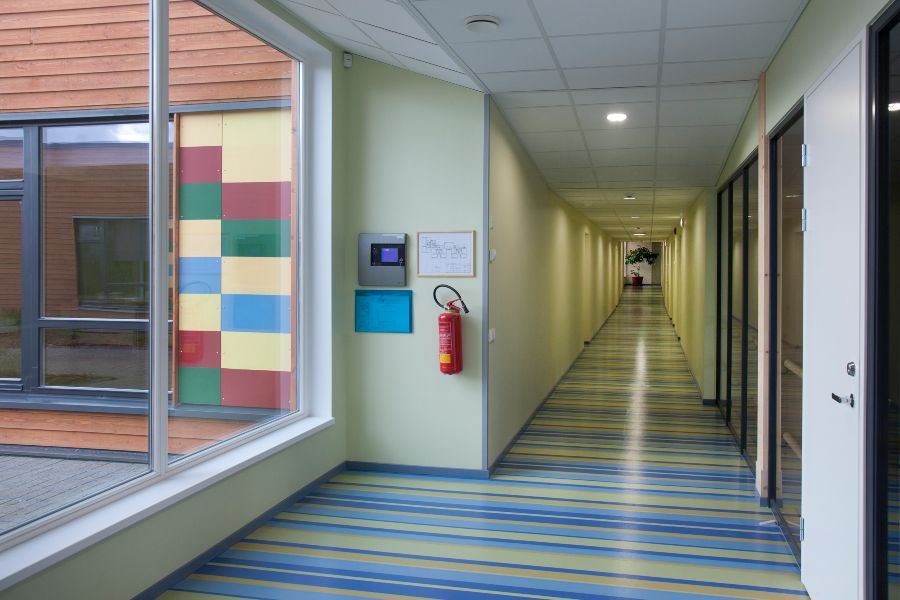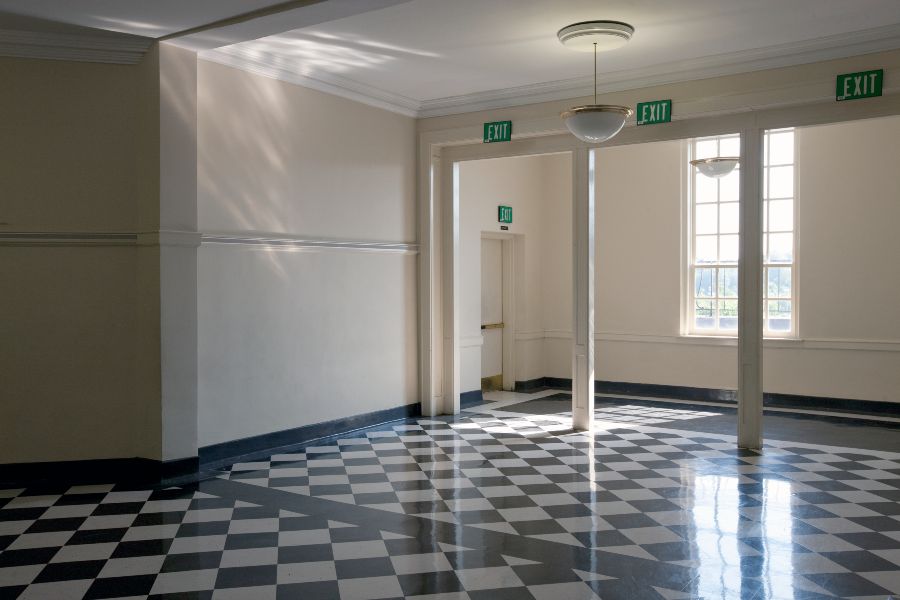Why is it so important to keep school floors clean by hiring professional services? Continue reading to learn more.
The busy hallways and classrooms of educational institutions mean one thing: countless footsteps and the residue of daily activities, which leads to buildup of dirt and potential hazard for children and professors.
And the truth is, most educational institutions tend to focus on maintaining tidy classrooms and hygienic restrooms – but they overlook the cleanliness of school floors. In this article, we will discuss some of the most important reasons for keeping school floors clean to ensure accident prevention and enhanced learning experience.
So, without further ado, let’s jump right into it:
What are the main reasons for keeping school floors clean?
1. Enhances safety & prevents hazards
You might have guessed it already – the number #1 reason for keeping school floors clean is safety. While we tend to associate dirty floors with appearance and hygiene, the buildup of residue can also lead to potential hazards that many educational institutions are not taking into account.
One of the primary safety concerns in schools is slip and fall accidents. Wet or dirty floors can become slippery, increasing the risk of students or staff members losing their balance and falling. Clean floors with proper traction reduce this risk significantly.
Accidents on school premises can result in serious injuries, leading to medical expenses, potential lawsuits, and disruptions to the learning environment. By maintaining clean floors, schools can actively reduce the likelihood of accidents.
In addition, clean floors are particularly crucial for students with disabilities who use mobility aids such as wheelchairs or crutches. Uneven or dirty surfaces can impede their movement and pose a significant safety hazard, that’s why it’s important to keep school floors clean.
Maintaining a good cleaning routine is also crucial for emergency evacuations – in case of fire drills or other emergency situations, clear and unobstructed pathways are essential for the safe evacuation of students and staff. Clean floors ensure that there are no obstacles hindering quick and safe exits.
And last but not least, schools are often required to comply with safety regulations and standards established by local and national authorities. Clean and well-maintained floors are a crucial aspect of meeting these safety requirements, ensuring that the school remains in legal compliance.
2. Helps with the physical health of staff and students
Another important reason for keeping school floors clean is building a healthier indoor environment by minimizing the accumulation of dust, allergens, and harmful microorganisms.
Dust, pollen, and other allergens accumulate on floors over time. These particles can trigger allergies and asthma attacks, especially in individuals with sensitivities. Regular cleaning and removal of dust and allergens help create an environment that is friendlier and more conducive to respiratory health.
In addition, damp or dirty floors can provide a breeding ground for mold and mildew, which release spores that can be harmful when inhaled. Clean floors with proper ventilation help prevent the growth of these harmful microorganisms.
The transmission of infections can also be a concern if you are not keeping school floors clean, especially considering how students and staff are in close contact during the school day. Clean floors, especially in high-traffic areas and common spaces, help reduce the spread of germs and viruses.
This is particularly important during flu seasons and outbreaks of contagious diseases.
3. Contributes to better mental health
Physical health is extremely important when it comes to children and professors, but keeping school floors clean is also essential for maintaining a good mental health and overall well-being.
A clean and tidy environment has been linked to improved mental well-being. Students and staff in a clean and organized school are more likely to feel motivated, focused, and less anxious, which in turn supports overall health.
In addition, clutter, dirt, and disorganization can contribute to stress and anxiety. Clean floors and well-kept spaces help reduce stress levels, allowing for improved concentration and overall mental health.
A clean environment can also boost productivity among both students and staff. When individuals are not distracted by mess and clutter, they can focus more effectively on their tasks and responsibilities.
4. Makes the floors last longer
Another overlooked benefit of keeping school floors clean is that it increases the longevity of school floors, cutting costs for the school over the long run.
Regular cleaning and maintenance help remove dirt, grit, and debris that can scratch and abrade the surface of flooring materials such as hardwood, vinyl, or tile. By preventing wear and tear, clean floors can significantly extend their lifespan.
In addition, many types of school floors have protective finishes or coatings that provide durability and shine. Keeping these finishes clean and free from dirt and contaminants helps preserve their effectiveness and prolongs the life of the flooring material underneath.
Clean floors are also less likely to suffer water damage. Standing water or moisture accumulation can warp wood, cause tile grout to deteriorate, or create conditions conducive to mold growth. Proper cleaning and drying procedures help prevent water-related damage.
5. Reduces maintenance costs
As we mentioned earlier, keeping school floors clean is also essential for education institutions because it reduces maintenance cost.
Regular cleaning and maintenance of school floors serve as a form of preventative maintenance. By addressing minor issues promptly, such as stains, wear, or damage, schools can prevent these problems from escalating into more significant and costly repairs or replacements.
Well-maintained floors are easier to deep clean when necessary. Regular cleaning prevents the buildup of deep-seated dirt and grime, making the deep cleaning process more efficient and cost-effective.
The cost of replacing school flooring materials, especially in large areas like gymnasiums or multipurpose halls, can be substantial. Extending the life of existing floors through proper cleaning and maintenance translates into significant cost savings by delaying the need for new flooring installations.
6. Creates a positive first impression
Clean floors create a positive first impression for students, parents, visitors, and staff who enter the school. An orderly and clean environment sends a welcoming and professional message, setting a positive tone for the entire educational experience – that’s why it’s crucial to keep school floors clean.
A clean school environment is often associated with professionalism and attention to detail. When floors are well-maintained and free from dirt and clutter, it reflects positively on the school’s administration, staff, and commitment to quality education.
Aesthetically pleasing surroundings can have a positive impact on students’ attitudes and behavior. Clean floors contribute to a visually appealing learning environment, potentially leading to increased student engagement and participation.
7. Improves the indoor air quality
Keeping school floors clean is closely linked to improved indoor air quality (IAQ), which has a significant impact on the health and well-being of students and staff.
Clean floors play a pivotal role in reducing the accumulation of dust, dirt, and allergens. Dust particles, pollen, pet dander, and other allergens tend to settle on floors.
Regular cleaning methods, such as vacuuming and damp mopping, effectively capture and remove these particles from the floor, preventing them from becoming airborne and compromising IAQ.
Indoor pollutants, such as volatile organic compounds (VOCs) from cleaning products and materials, can negatively impact IAQ.
Proper cleaning practices and the use of low-VOC or environmentally friendly cleaning products help reduce the release of harmful pollutants, maintaining healthier air quality.
Hiring professional school floor cleaning services
Keeping school floors clean is essential for educational institutions, but it can be an extremely time-consuming and laborious task if you are trying to do it on your own.
Hiring professional school floor cleaning services will not only take this load off your chest, but will also ensure that you are getting professional quality and meeting all the local and national requirements for compliance, effectively reducing risk hazards.
TCS Floors is a nationally-recognized commercial floor care company specialized in schools, universities and colleges. With over 30 years of experience, our trustworthy technicians will ensure that your school floors are always clean and impeccable to maintain the safety of your staff and students, create a great first impression, improve air quality, and prevent accidents resulting from dirty floors.
FAQ
Why is it important to keep school floors clean?
Keeping school floors clean is crucial for safety, health, and aesthetics. Clean floors prevent accidents, reduce allergens, and create a positive learning environment.
They also extend the lifespan of flooring materials, saving on maintenance costs, and contribute to better indoor air quality, ultimately enhancing the overall well-being of students and staff.
What are the hazards of dirty school floors?
Dirty school floors can lead to slip and fall accidents due to increased slipperiness. They accumulate dust, allergens, and mold, worsening indoor air quality and causing respiratory issues. Contaminated floors can harbor germs, facilitating disease spread.
Allergens like dust mites and pet dander accumulate, triggering allergies. Dirt and debris can scratch floors, reducing their lifespan. Unpleasant odors and pest infestations may result, and the school’s appearance can degrade, leaving a negative impression on students, parents, and visitors.
How do professionals keep school floors clean?
Professionals maintain clean school floors through a systematic approach. They start by removing debris and dust with vacuums or sweepers. Then, they use appropriate cleaning solutions and equipment like mops or auto-scrubbers to deep clean and disinfect. Stains and spills are promptly addressed.
Regular maintenance includes buffing, waxing, or polishing to restore shine and protect floors. Professionals follow safety guidelines and use eco-friendly products for a healthier environment.




